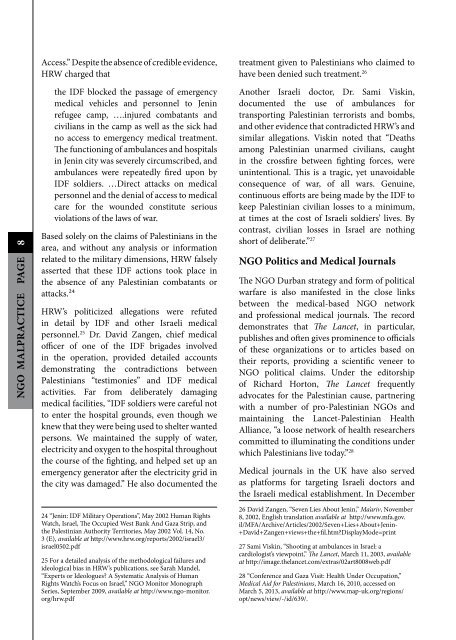NGO Malpractice
NGO_Malpractice
NGO_Malpractice
- No tags were found...
You also want an ePaper? Increase the reach of your titles
YUMPU automatically turns print PDFs into web optimized ePapers that Google loves.
Access.” Despite the absence of credible evidence,<br />
HRW charged that<br />
treatment given to Palestinians who claimed to<br />
have been denied such treatment. 26<br />
ngo malpractice page 8<br />
the IDF blocked the passage of emergency<br />
medical vehicles and personnel to Jenin<br />
refugee camp, ….injured combatants and<br />
civilians in the camp as well as the sick had<br />
no access to emergency medical treatment.<br />
The functioning of ambulances and hospitals<br />
in Jenin city was severely circumscribed, and<br />
ambulances were repeatedly fired upon by<br />
IDF soldiers. …Direct attacks on medical<br />
personnel and the denial of access to medical<br />
care for the wounded constitute serious<br />
violations of the laws of war.<br />
Based solely on the claims of Palestinians in the<br />
area, and without any analysis or information<br />
related to the military dimensions, HRW falsely<br />
asserted that these IDF actions took place in<br />
the absence of any Palestinian combatants or<br />
attacks.24<br />
HRW’s politicized allegations were refuted<br />
in detail by IDF and other Israeli medical<br />
personnel. 25 Dr. David Zangen, chief medical<br />
officer of one of the IDF brigades involved<br />
in the operation, provided detailed accounts<br />
demonstrating the contradictions between<br />
Palestinians “testimonies” and IDF medical<br />
activities. Far from deliberately damaging<br />
medical facilities, “IDF soldiers were careful not<br />
to enter the hospital grounds, even though we<br />
knew that they were being used to shelter wanted<br />
persons. We maintained the supply of water,<br />
electricity and oxygen to the hospital throughout<br />
the course of the fighting, and helped set up an<br />
emergency generator after the electricity grid in<br />
the city was damaged.” He also documented the<br />
Another Israeli doctor, Dr. Sami Viskin,<br />
documented the use of ambulances for<br />
transporting Palestinian terrorists and bombs,<br />
and other evidence that contradicted HRW’s and<br />
similar allegations. Viskin noted that “Deaths<br />
among Palestinian unarmed civilians, caught<br />
in the crossfire between fighting forces, were<br />
unintentional. This is a tragic, yet unavoidable<br />
consequence of war, of all wars. Genuine,<br />
continuous efforts are being made by the IDF to<br />
keep Palestinian civilian losses to a minimum,<br />
at times at the cost of Israeli soldiers’ lives. By<br />
contrast, civilian losses in Israel are nothing<br />
short of deliberate.” 27<br />
<strong>NGO</strong> Politics and Medical Journals<br />
The <strong>NGO</strong> Durban strategy and form of political<br />
warfare is also manifested in the close links<br />
between the medical-based <strong>NGO</strong> network<br />
and professional medical journals. The record<br />
demonstrates that The Lancet, in particular,<br />
publishes and often gives prominence to officials<br />
of these organizations or to articles based on<br />
their reports, providing a scientific veneer to<br />
<strong>NGO</strong> political claims. Under the editorship<br />
of Richard Horton, The Lancet frequently<br />
advocates for the Palestinian cause, partnering<br />
with a number of pro-Palestinian <strong>NGO</strong>s and<br />
maintaining the Lancet-Palestinian Health<br />
Alliance, “a loose network of health researchers<br />
committed to illuminating the conditions under<br />
which Palestinians live today.” 28<br />
Medical journals in the UK have also served<br />
as platforms for targeting Israeli doctors and<br />
the Israeli medical establishment. In December<br />
24 “Jenin: IDF Military Operations”, May 2002 Human Rights<br />
Watch, Israel, The Occupied West Bank And Gaza Strip, and<br />
the Palestinian Authority Territories, May 2002 Vol. 14, No.<br />
3 (E), available at http://www.hrw.org/reports/2002/israel3/<br />
israel0502.pdf<br />
25 For a detailed analysis of the methodological failures and<br />
ideological bias in HRW’s publications, see Sarah Mandel,<br />
“Experts or Ideologues? A Systematic Analysis of Human<br />
Rights Watch’s Focus on Israel,” <strong>NGO</strong> Monitor Monograph<br />
Series, September 2009, available at http://www.ngo-monitor.<br />
org/hrw.pdf<br />
26 David Zangen, “Seven Lies About Jenin,” Ma’ariv, November<br />
8, 2002, English translation available at http://www.mfa.gov.<br />
il/MFA/Archive/Articles/2002/Seven+Lies+About+Jenin-<br />
+David+Zangen+views+the+fil.htm?DisplayMode=print<br />
27 Sami Viskin, “Shooting at ambulances in Israel: a<br />
cardiologist’s viewpoint,” The Lancet, March 11, 2003, available<br />
at http://image.thelancet.com/extras/02art8008web.pdf<br />
28 “Conference and Gaza Visit: Health Under Occupation,”<br />
Medical Aid for Palestinians, March 16, 2010, accessed on<br />
March 5, 2013, available at http://www.map-uk.org/regions/<br />
opt/news/view/-/id/639/.


